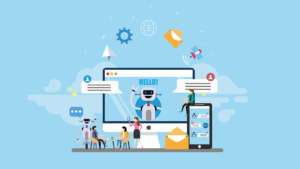Daily your organization waits to use revolutionary AI-powered content marketing solutions, you lose a competitive advantage.
If this came out as a little theatrical, that’s wonderful. Its goal is to keep your marketing team alert and ready to accept AI-powered marketing solutions. Artificially intelligent algorithms are always at work behind the scenes of well-known companies and services like Netflix, Amazon, and, of course, Google.
However, in recent years, AI has made inroads into marketing, assisting firms in improving every stage of the consumer experience. Furthermore, resources that were previously only available to large corporations have become more inexpensive and accessible to medium- and small-sized organizations. A firm focusing on building AI-powered solutions, to have a deeper understanding of the current machine-learning applications in marketing. Whereas crunching all the information and matching them to client behavioral patterns would take a long time for humans, AI can provide marketing insights on the go.
Amazon, Facebook, and Pinterest are among the companies that use AI-powered picture recognition to identify people and objects in photographs and videos. Marketers may now achieve a previously unattainable goal: engaging with each individual client in a tailored and meaningful way, thanks to AI.

1.Making Videos That Are Culturally Appropriate
Most businesses research alternative video editing tools and devote time and resources to creating films that would entice potential consumers. Creating a video for a company with a varied population as their target audience may be difficult since what is acceptable in one place may not be suitable in another.
Religious and cultural inhibitions have a big influence in determining one’s taste, hence corporations are sometimes required to make many movies with minor changes for different regions. Videos become considerably more adaptable with an AI platform, and modifications may be automated based on current data. This allows for a lot of flexibility and goes a long way toward boosting a video’s reach.
2.Video Planning & Artificial Intelligence
The AI statistics may be deployed to videos on your media platforms in addition to those on your website. The AI analytics tool may then tap into the engagement and collect data based on user involvement while a Facebook (or IGTV) video is being shown.
These may then be used to assess how viewers reacted to a video to determine which points were more well-received. This is something the brand should keep in mind while designing future videos.
3.Artificial Intelligence to Assist Users in Recovering Abandoned Carts
If your company has an online store, you’ll notice that many potential buyers add products to their shopping carts, then leave them there and leave the site. Understand that the majority of these occurrences occur because the consumer is unfamiliar with digital technology and may have accidentally pressed the exit button.
They prefer not to postpone their shopping plans since they would have to go through the effort of picking their preferred goods all over again. Another typical occurrence is when they are window shopping and some pressing task comes up, forcing them to abandon their virtual buying basket. An efficient method for you to make the most of moments like these as a brand is to utilize the power of social media.
You may utilize AI technologies to send a registered user an email with information about the products in their abandoned cart, prompting them to reconsider their choice. Because the goods they would have put to the basket are products they enjoy, the likelihood of them making a purchase is much higher.
It becomes simpler to customize your services and establish a commercial relationship with each unique user if you have an AI-based mechanism on your website. As a result, they are more likely to choose you over your competition, providing your company the push it has always needed.
4.Pay-per-click (PPC) advertising using AI
The majority of marketers spend their PPC money on AdWords and Facebook. According to eMarketer, Google has 40.7 percent of the digital ad market in the United States, followed by Facebook with 19.7%. In-house teams of PPC agencies manage the majority of pay-per-click marketing campaigns. Humans, in all other words. However, AI can assist you in discovering new advertising channels that your competitors may not be aware of.
“AI-powered solutions can help advertisers test out new ad channels and optimize targeting,” Markus says. That’s exactly what Fb’s ad distribution optimization is aiming for. However, utilizing third-party or in-house AI technologies, this strategy might be applied to omnichannel PPC campaign data (owned by a single company).”
Independent media buying is a service provided by an artificial intelligence marketing platform. While AI analyses, controls, and optimizes paid ad campaigns, this strategy requires little human involvement.
- Content production aided by AI
Natural-language generation has enormous promise for improving the efficiency of content providers’ labor. Machines will create 25% of all corporate content by near future. You can see here for leading ai recruitment agency.

Machines may now produce content using simple rule sets and formats like:
- Quarterly business reports
- Profit and loss summaries
- Descriptions of the hotels
- Insights on the stock market in real-time
- Sporting event recaps
Every AI-generated story is intended to read like a human-written story. Each narrative’s data insights and writing style are determined by the rules and formats specified by your brand to best serve your target audience.
6.Chatbots that generate content
If you’ve lately interacted online with a customer service representative, your kind correspondent called Ashley or Jen may have kept a secret from you: she’s a bot.
Intelligent chatbots are delivering borderline magical customer service in a variety of industries, including fashion, health, and insurance. In certain circumstances, they’re even better than people at developing individualized content.
“Bots possess access to millions of customer-centric data points,” says the author. They may also combine location-specific requests to find trends, identify recurring difficulties, and forecast what’s causing trouble for a certain user,”. “As a result, they are frequently more informed than any human customer support representative.”
Chatbots, on the other hand, aren’t just for direct customer support interactions.
But chatbots aren’t limited to direct customer service interactions.
By automating and optimizing common procedures and procedures, you may save time and money. Boost productivity and efficiency in your operations. create quicker business choices based on cognitive technology outputs and see here for leading ai recruitment agency.